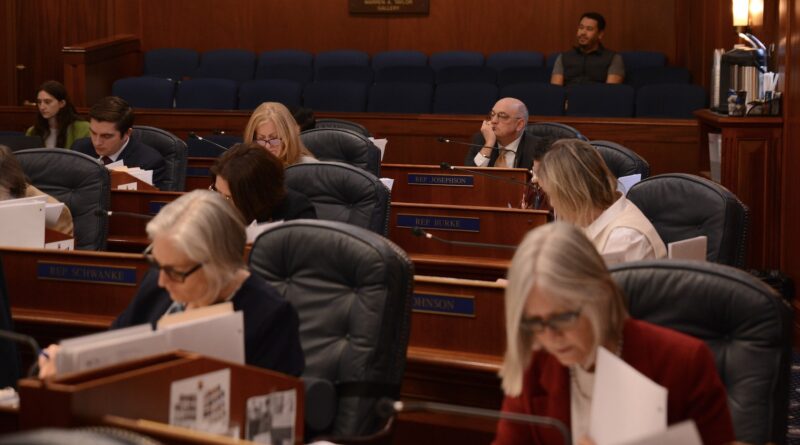Alaska House votes down symbolic antiabortion budget language, passes amendment against trans care
For the first time in more than 25 years, the Alaska House of Representatives has voted against budget language that seeks to limit Medicaid coverage for abortions.
On Monday, the House failed by a single vote to approve a budget amendment that would forbid the state from spending money on abortions unless they are deemed a “mandatory service” under Medicaid.
The amendment received 20 votes, all from Republicans; 21 votes were needed to approve the amendment, which has been a feature of the state budget since at least 2001.
Hours later, the House approved a different amendment that seeks to adopt a similar approach with regard to gender dysphoria and care for transgender Alaskans.
That amendment passed 21-19 on a strict party-line vote, as both Republican members of the House’s coalition majority joined members of the minority Republican caucus to pass it.
Both actions are not final — they would have to be mirrored by the state Senate — but nonetheless have significant symbolic value.
The Alaska House of Representatives has repeatedly and unsuccessfully attempted to restrict abortion access since the Alaska Supreme Court ruled in 1997 that the privacy clause of the state constitution protects abortion rights.
Each year, under an amendment to the state budget, state lawmakers have attempted to restrict abortion under Medicaid by limiting coverage to only what’s deemed medically necessary.
Introducing the abortion amendment was Rep. Sarah Vance, R-Homer.
“The courts have weighed in on this issue, and it is the value and the principle of Alaskans that we preserve life,” she said.
“The executive branch has provided support for this, the Legislature has provided support for this. So this is simply restoring the language that we have previously had,” Vance said.
The budget language has had limited practical effect because doctors need only fill out a form to demonstrate that a procedure is medically necessary, and an attempt to define what’s medically necessary was struck down in court.
The Alaska Supreme Court ruled that using different definitions for abortion and for other cases violated the right to equal protection of the laws under the Alaska Constitution.
Nevertheless, the amendment has turned into an annual statement of intent. In 2019, the state Senate initially failed to adopt the amendment, though the final budget included language from the House. Until this year, the House had never failed to adopt the amendment.
This year’s amendment came down to Rep. Louise Stutes, R-Kodiak, who initially voted in favor of the amendment but changed her mind before voting closed.
“I’m just trying to do the right thing, and putting it in the budget is the wrong thing,” Stutes said afterward. “Aside from the fact that I believe the state doesn’t belong between a woman and her doctor — and our state constitution protects that — I think the intent language, if it were enforced, it’s unconstitutional. So it’s kind of meaningless to put it in the budget.”
Hours later, Stutes and Rep. Chuck Kopp, R-Anchorage, the majority leader, joined 19 members of the House’s Republican minority to add similar language regarding gender dysphoria to the state budget.
If adopted by the Senate and Gov. Mike Dunleavy, it’s unclear what effect the amendment would have. Although a 2021 lawsuit resulted in a federal ruling that requires Alaska’s Medicaid program to cover gender-affirming care, the Alaska Supreme Court has not considered the issue, and the case law around the topic is not established as well as it is for abortion, experts said.
“We’re grateful that for the first time in recent memory, the House did not insert the harmful and performative amendment aimed at stripping patients with low incomes access to coverage for abortion. Unfortunately, the same body adopted an equally harmful and performative amendment attacking gender affirming health care,” said Rose O’Hara-Jolley, Alaska State Director for Planned Parenthood Alliance Advocates. “We urge the body not to adopt either amendment in its final version — we’re relying on them to stand with all Alaskans, regardless of their income or gender identity.”
Debate continued Tuesday on more amendments to the House’s version of the state operating budget.

